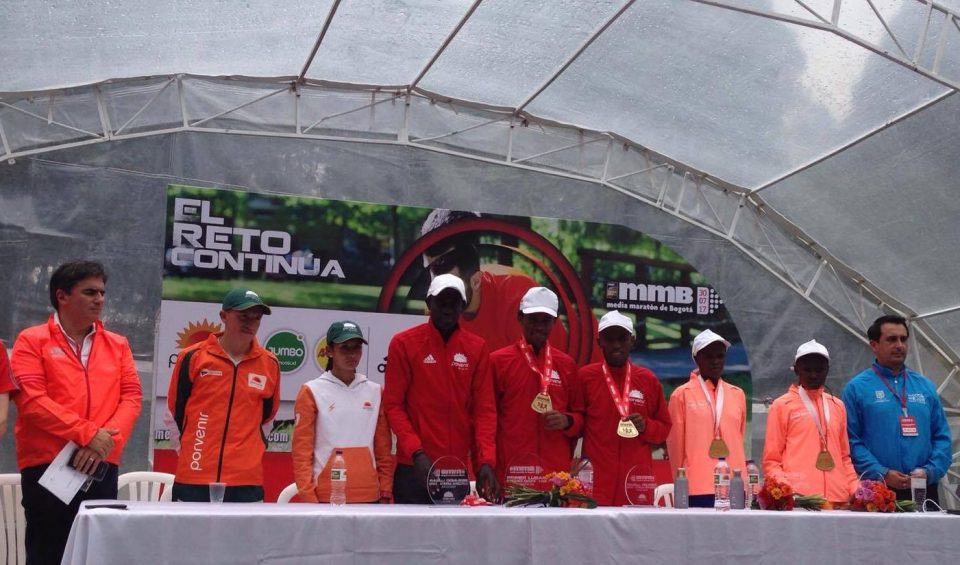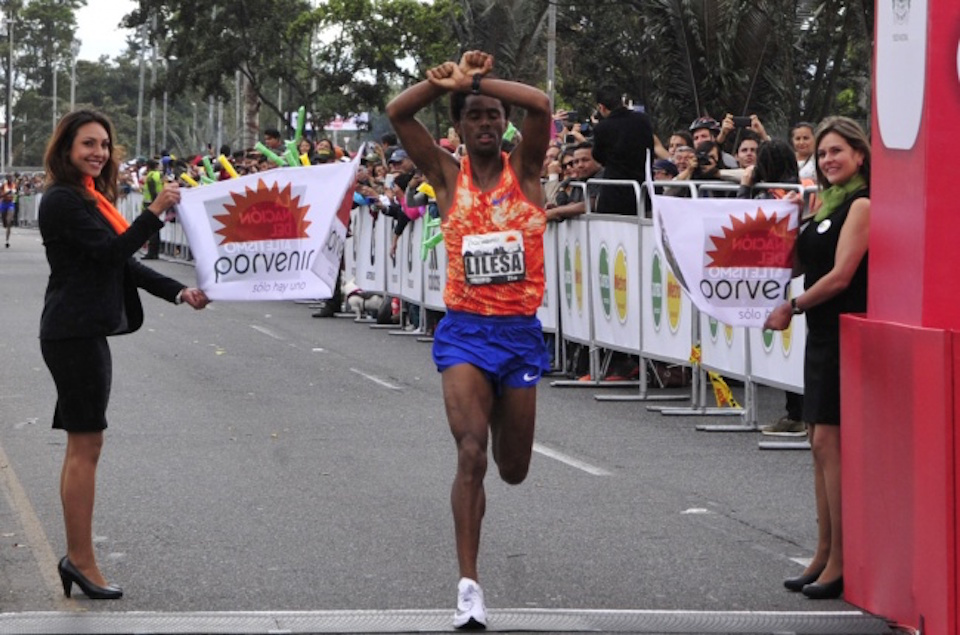
Feyisa Lilesa and Brigid Kosgei are presented with their winners medals .
Media Maratón winner, Feyisa Lilesa crosses his arms at the finish line to protest against the treatment of the Oromo people in Ethiopia.
Feyisa Lilesa and Brigid Kosgei took the men’s and women’s titles respectively at the 18th edition of the Bogotá Media Maratón on Sunday, July 30. The Ethiopian and Kenyan runners claimed the top spots in the prestigious race with Lilesa clocking in at 1:04:30, and Kosgei completing the 21 kilometer run in 1:12:16.
Over 43,000 people gathered in the Parque Simón Bolívar on a somewhat grey and drizzly morning to compete in different categories of the most important running competition in Latin America.
Because of the city’s altitude, the Bogotá Media Maratón is more demanding than other races. This is the reason why it attracts a number of elite athletes from all over the world, who use the high altitude gold label race as preparation for major marathons like Berlin and New York later in the year.
Kosgei said the conditions here were a huge issue for her, because she is used to training in Kenya where the climate is completely different. Kosgei also said the weather and altitude could have been the reason why she collapsed at the end of the race. Nevertheless, Kosgei said she was happy with her title.
For Feyisa Lilesa, altitude was also a challenge because he is used to training in the United States at about 2,100 metres, while Bogotá is at 2,600 metres above sea level, which is an important difference.
Peter Kirui was just behind him in the men’s category, placing second with a time of 1:04:39, while Shura Kitata placed third with a time score of 1:05:04.
Lilesa’s victory was not the only thing that made the athlete stand out. The silver medallist in the Rio 2016 Olympic Games has been using his sporting success to draw attention to the plight of the Oromo people in his country.

Feyisa Lilesa crossing the finish line as winner of the 2017 Bogotá half marathon.
Here in Bogotá, as he did in Rio, Lilesa crossed his arms above his head as he crossed the finish line in a gesture of defiance against the Ethiopian government.
“This [crossing his arms] means stop killing, stop jail, stop land grabbing,” Lilesa said. He explained that when the Ethiopian government are killing the Oromo, Amhara and Gambela people, there can be no peace.
Lilesa said he was very happy with the results of the race because it is very difficult for an athlete to succeed at the end. He also said that if everything goes well he would be coming back next year.
“I feel wonderful because five years ago I did second position,” Lilesa said. “I like Bogotá a lot. If everything is really good next year I will try to come.”
Five years ago Lilesa placed second against Peter Kirui from Kenya. This year Lilesa won the title and Kirui placed second, with a difference of just nine seconds between the two racers.
Kirui said the next time he runs the Media Maratón he plans on winning, and explained how he thinks Lilesa pipped him to the post this time.
“At 20 km I saw he’s behind me, and I knew that he’s very strong in finishing,” Kirui said. “So, no more, I tried to push, but he’s still behind me, so he stays with me, and then he pushed the last 12 metres, so I ended up losing.”
In the women’s category, the silver medal went to Veronicah Wanjiru. The Kenya had also taken the second place last year, but she was able to improve her time from 1:13:41 in 2016 to 1:12:42. Ruth Chepngetich, also from Kenya, who won the Istanbul Half Marathon earlier this year, took the third place.
Kosgei beat Wanjiru by 26 seconds and Chepngetich by 1:41 seconds.
Although the Colombian competitors didn’t make the podium, Angie Orjuela, who placed seventh and Miguel Amador, who placed tenth, were both recognised at the press conference by both the organisers and sponsors of the Media Maratón.





